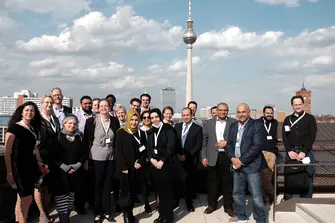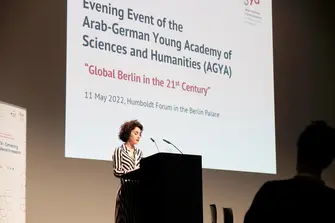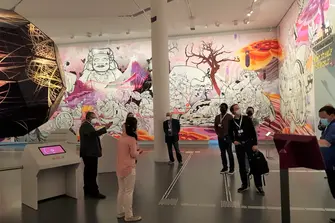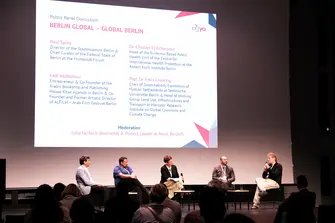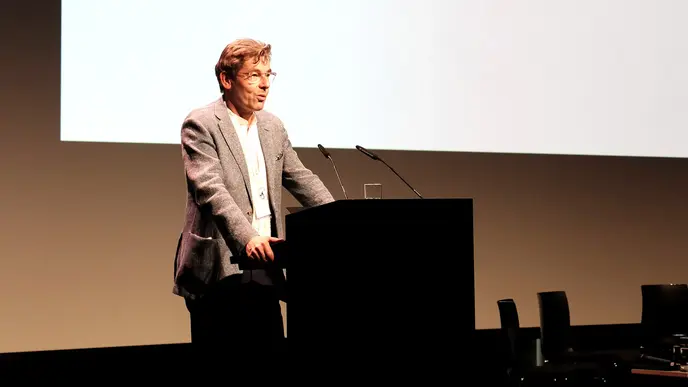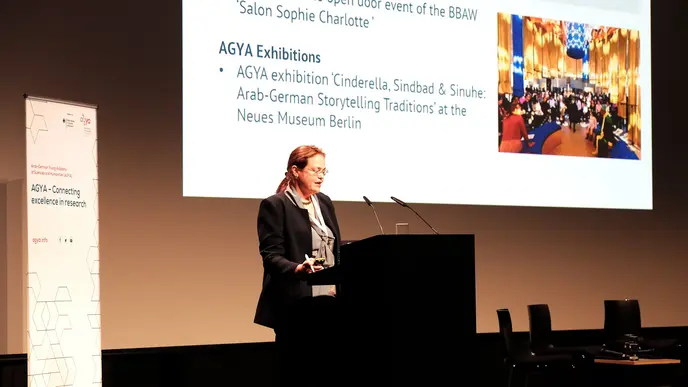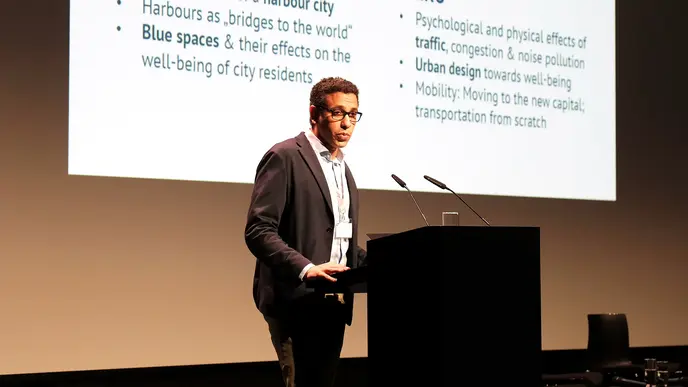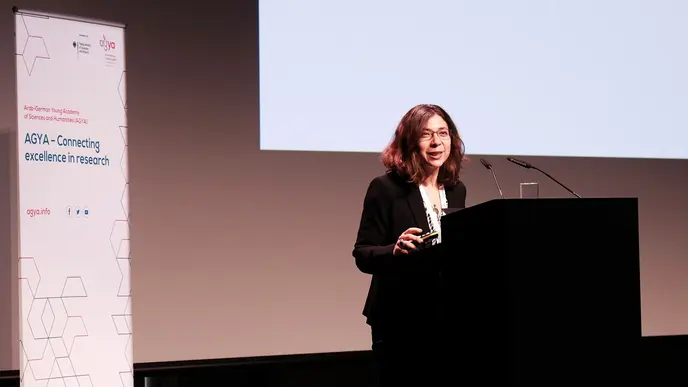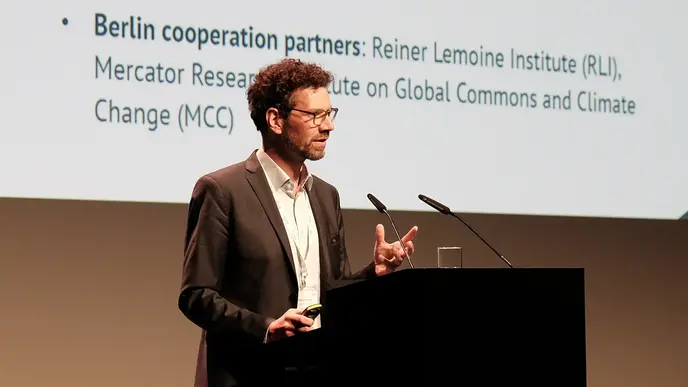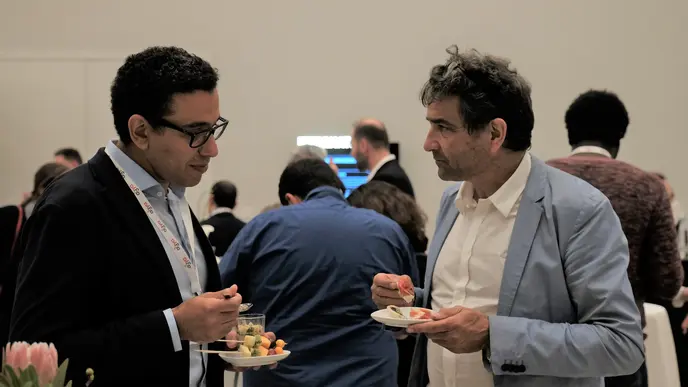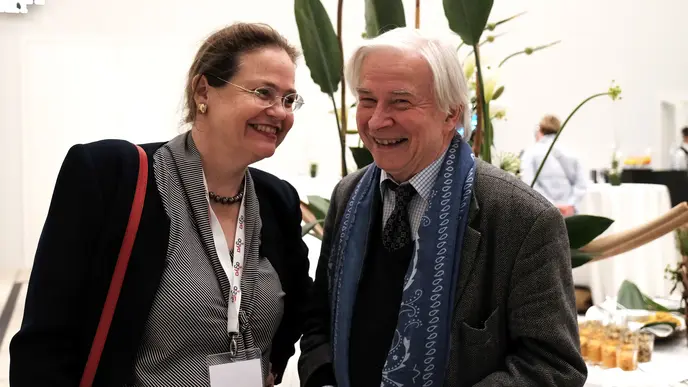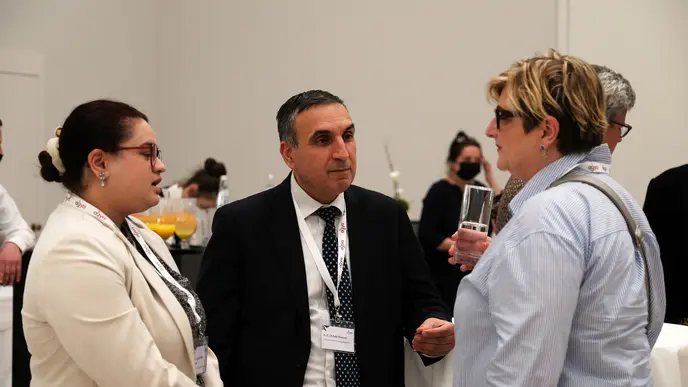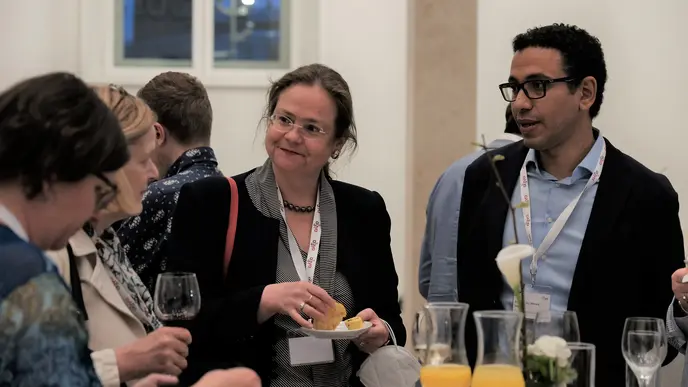Global Berlin in the 21st Century
What does Berlin stand for in the 21st century? How is Berlin changing due to global developments? Which impact does Berlin have in the areas of health, mobility, migration and social transformation as well as in the cultural sector?
The AGYA research project ‘Global Berlin in the 21st Century’ explored these questions from an Arab and German perspective. Different AGYA members and alumni coming from various disciplinary backgrounds such as health and sports sciences, law and communication sciences, engineering and computer sciences as well as Egyptology and museology provided new views on Berlin. The research topics ranged from urban health to Arab perspectives on transformation processes in Berlin and concepts of sustainable mobility to strategies of cultural education in the digital age:
Health and Happiness. Arab-German Perspective on Living Environments in Larger Cities, in cooperation with Charité – University Medicine Berlin (project lead: Prof. Dr. Dr. Ahmed Hegazy & Prof. Dr. Mohammed Alkatan)
Arab Perspective on Transformation in Berlin, in cooperation with Humboldt University Berlin (project lead: Dr. Nahed Samour & Prof. Dr. Hanan Badr)
Urban Smart Mobility Concepts in Berlin, in cooperation with TU Berlin (project lead: Prof. Dr. Felix Creutzig, Dr. Philipp Blechinger & Dr. Djamel Djenouri)
Papyrus to Twitter. New Forms of Museum Presentations in A Digital Age, in cooperation with Prussian Cultural Heritage Foundation, Berlin (project lead: Prof. Dr. Verena Lepper & Prof. Dr. Tarek Tawfik)
Public evening event at Humboldt Forum: New insights into Berlin
All four interdisciplinary projects yielded interesting new insights about this unique and globally known metropolis. To celebrate this success and share the project results with policymakers, academia and society alike, AGYA hosted a public event at the Humboldt Forum in the new Berlin Palace on 11 May 2022. The event was realized in a hybrid format in order to achieve a greater outreach, both locally as well as internationally.
The event was festively opened by Armaghan Naghipour, Permanent Secretary for Higher Education, Research and Gender Equality at the Senate Department for Higher Education and Research, Health, Long-Term Care and Gender Equality, Berlin, and Prof. Dr. Hartmut Dorgerloh, General Director of the Humboldt Forum and Chairman of the Board of the Humboldt Forum Foundation in the Berlin Palace. AGYA Principal Investigator Prof. Dr. Verena Lepper warmly welcomed all guests and introduced the research topic.
AGYA offers a unique opportunity to attract outstanding Arab scientists and promotes Berlin’s cultural and academic significance in the Arab world. As a hotspot for higher education and research, Berlin is an ideal setting for this kind of international cooperation.
Armaghan Naghipour, Permanent Secretary for Higher Education, Research and Gender Equality at the Senate Department for Higher Education and Research, Health, Long-Term Care and Gender Equality, Berlin
The AGYA members and alumnae led through the next highlight of the evening – the presentation of the research results. The audience listened to a sound sample of the podcast ‛Happyopolis’ and learned about concepts of walkability in Kuwait City or strategies to cope with urban stress in Berlin from Prof. Dr. Dr. Ahmed Hegazy. Dr. Philipp Blechinger presented policy recommendations and case studies for new concepts of sustainable urban mobility. In the published e-paper, readers can learn about alternative transport modes (e.g. electric transport, walking & cycling, public transport), just transport and gender equity, as well as sustainable transport policies in Amman, Beirut, Berlin, Cairo, Ramallah, and Bogotá. AGYA alumna Prof. Dr. Hanan Badr introduced the kaleidoscopic publication concept of ‘Arab Berlin: Dynamics of Transformation’, which provides an Arab perspective on transformation processes in Berlin in a variety of formats ranging from scientific articles and essays to interviews and photo contributions. Interesting new insights into museum landscapes were offered by AGYA alumna Prof. Dr. Verena Lepper who presented an overview of identified best-practice examples of analog, hybrid and digital presentation formats that are being used by museums/exhibitions in the Arab world and Germany, but also internationally, to exhibit particularly challenging objects such as manuscripts, papyri, ostraca or literature. The research results are to be published in a trilingual book publication.
Public panel discussion: Berlin as a hub of knowledge production
A public panel discussion on ‘BERLIN GLOBAL – GLOBAL BERLIN’ invited high-ranking Arab and German representatives of Berlin`s political, academic and cultural landscape:
- Paul Spies, Director of the Stadtmuseum Berlin & Chief Curator of the Federal State of Berlin at the Humboldt Forum
- Prof. Dr. Felix Creutzig, Chair of Sustainability Economics of Human Settlements at Technische Universität Berlin & Head of the Working Group Land Use, Infrastructures and Transport at Mercator Research Institute on Global Commons and Climate Change, Berlin
- Fadi Abdelnour, Entrepreneur & Co-Founder of the Arabic Bookshop and Publishing House Khan Aljanub in Berlin & Co-Founder and Former Artistic Director of ALFILM - Arab Film Festival Berlin
- Dr. Charbel El Bcheraoui, Head of the Evidence-Based Public Health Unit of the Centre for International Health Protection at the Robert Koch Institute (RKI) Berlin
The panellists discussed the role of Berlin as an international hub of knowledge production with a particular focus on the current debates in the fields of urban health, dynamics of transformation, sustainable mobility, and cultural education, and explored to what extent change processes in Berlin are having an impact far beyond the city borders – and vice versa.
The program was enriched by a guided tour through the Humboldt Forum's highly interactive exhibition ‘BERLIN GLOBAL’, a participatory visitor experience that shows how the city and its people are connected to the world. The event also offered new perspectives on Berlin – from above – through a shared experience on the rooftop terrace of the Berlin Palace with its 360-degree panoramic round view.
By locating the event at the Humboldt Forum, the AGYA research project ‘Global Berlin in the 21st Century’ and the Humboldt Forum's exhibition ‘BERLIN GLOBAL’ were to be linked in order to achieve a synergy effect.
Valuable impetus to make Berlin an even more liveable city with model character
AGYA Principal Investigator Prof. Dr. Verena Lepper, Egyptian Museum and Papyrus Collection of the Staatliche Museen zu Berlin, emphasizes: ‘Berlin takes a central role as a location for science and innovation in the global context. With the numerous AGYA members and alumni affiliated in Berlin, a distinct expertise is concentrated here. The interdisciplinary investigation of this knowledge city from an Arab-German perspective has provided the latest insights, which give valuable impetus to make Berlin an even more liveable city with model character.’ With the funding of the Berlin Senate, AGYA was able to implement important research projects and to expand existing collaborations between Berlin institutions internationally.
Public evening event at Humboldt Forum
Date and Venue
11 May 2022
Humboldt Forum in the Berlin Palace, Berlin/Germany
Cooperation and Funding
‘Global Berlin in the 21st Century’ was carried out with renowned Berlin institutions and together with AGYA members and alumni from the Arab world. The project was funded by the Senate Chancellery – Higher Education and Research of the State of Berlin.
List of Projects
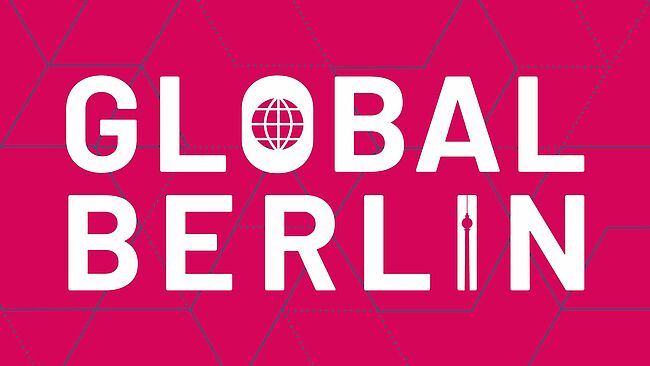
Global Berlin I
- Health and Happiness. Arab-German Perspective on Living Environments in Larger Cities, in cooperation with Charité – University Medicine Berlin (project lead: Prof. Dr. Dr. Ahmed Hegazy & Prof. Dr. Mohammed Alkatan)
- Arab Perspective on Transformation in Berlin, in cooperation with Humboldt University Berlin (project lead: Dr. Nahed Samour & Prof. Dr. Hanan Badr)
- Urban Smart Mobility Concepts in Berlin, in cooperation with TU Berlin (project lead: Prof. Dr. Felix Creutzig, Dr. Philipp Blechinger & Dr. Djamel Djenouri)
- Papyrus to Twitter. New Forms of Museum Presentations in A Digital Age, in cooperation with Prussian Cultural Heritage Foundation, Berlin (project lead: Prof. Dr. Verena Lepper & Prof. Dr. Tarek Tawfik)
Global Berlin II
- More than breadwinners: Arab-German perspectives on fatherhood in Berlin, in cooperation with Freie Universität Berlin (project lead: Prof. Dr. Sascha Hein & Dr. Hiba N. Rajha)
- From phonograph to web 3.0. Berlin’s historical sound recordings from the Arab regions, in cooperation with Berlin-Brandenburg Academy of Sciences and Humanities (project lead: Prof. Dr. Matthias Pasdzierny & Dr. Nadia Bahra)
- Philology and Archaeology in Berlin – Elephantine in Context, in cooperation with Prussian Cultural Heritage Foundation, Berlin (project lead: Prof. Dr. Verena Lepper & Prof. Dr. Tarek Tawfik)
Podcast: Happyopolis – Urban health and well-being
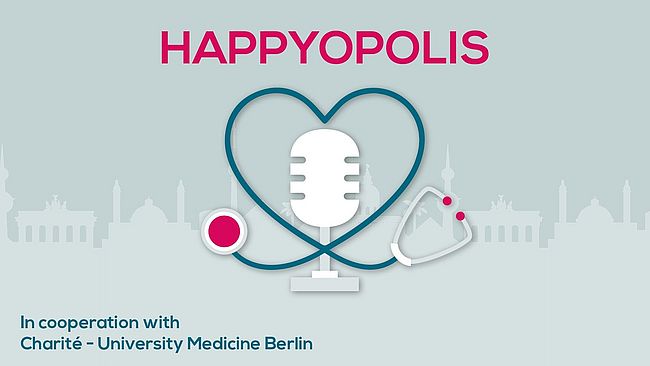
Welcome to the podcast ‘Happyopolis’!
We invite you to join us in exploring how to make city life healthier, more social, and of course, happier.
In each episode, we feature cities across the Arab region and Germany, which have developed ideas, concepts, and solutions for a happy and healthy city life. These are solutions that are not only worth discovering but also worth sharing with your own community. Listen to the episodes here!
